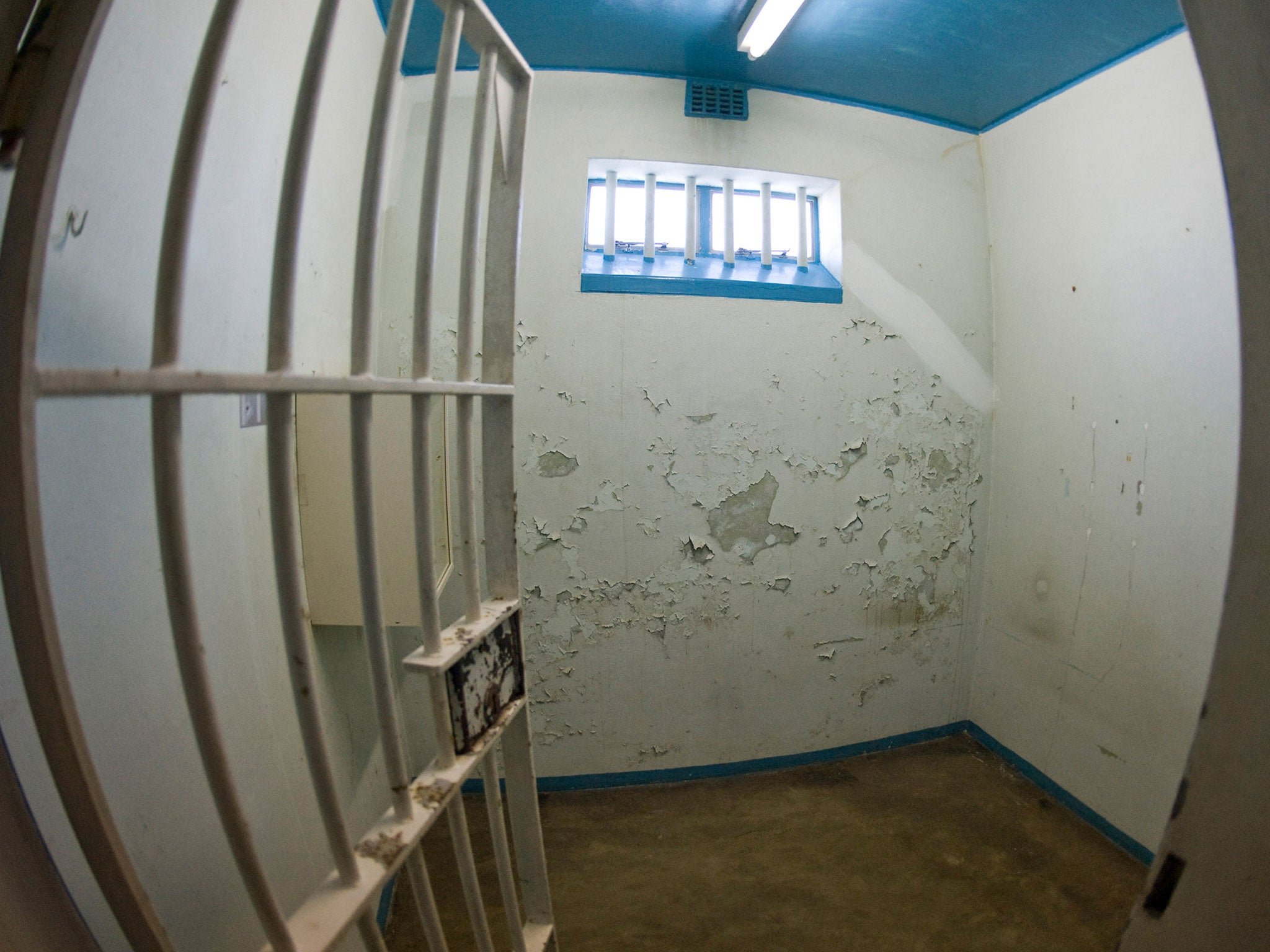Prisoners being left in squalid courtroom cells by private escort companies and told they have only 'the right to breathe', report says
'People are being treated in a disgusting fashion'

Vulnerable people are being left to languish for up to ten hours in filthy, squalid and graffiti-covered courtroom cells because private escort companies are more concerned with time-keeping than prisoner welfare, a report has revealed.
Custody staff from contractor GEOAmey told detainees the only right they had was the “right to breathe”, and described one transgender suspect as “the thing” in a series of comments recorded by prison inspectors.
The report examined the system under which two private companies take some 400,000 suspects between police stations and prisons to courts each year – as well as the conditions in which they are held before and after hearings. Even after their hearings concluded, suspects were left to wait in cells in the bowels of courtrooms because drivers of prison escort vans were needed to help out with security in court, the report found.
Court managers rarely visited cells and were often unaware of the filthy conditions and lack of heating and light. Inmates who needed medicine were supplied with too little to last them through the day.
“We found a dangerous disregard for the risks detainees might pose to themselves and others,” the report by the prisons’ inspectorate found. “Court custody is an accident waiting to happen.”
The report was drafted before the first death of a detainee in court custody for many years in London in April. In July, a security officer for Serco, Lorraine Barwell, died after an alleged attack by a suspect as he was being taken from Blackfriars Crown Court in London to a waiting prison van.
Inspectors, who examined 97 courthouses in England between 2012 and 2014, found that conditions were some of the worst they had found in any penal establishments.
Inmates are ferried to court by two groups – GeoAmey and Serco Wincanton – under seven year deals struck with the Ministry of Justice in 2011 that are meant to save the taxpayer £250 million.
Inspectors found that monitoring of the contracts focused on timeliness and security rather than care for the people they carried. Inspectors said that a GEOAmey custody officer was heard to say: “the only right you’ve got, dear, is the right to breathe”. The phrase was later repeated.
There was little risk assessment of vulnerable inmates, handcuffing was excessive – including of disabled detainees – and women faced harassment from men in prison vans on their way to court, the report found.
When they got to court, they were left in dirty cells with racist, offensive and abusive, messages. Some of the graffiti had been there for more than a decade without being cleaned up. “At some there was scarcely an inch of cell wall that was not covered in graffiti,” the report found. Several courts were found to have swastikas daubed on the walls and people named as paedophiles.
Another company was responsible for cleaning cells but a breakdown in the contract meant that custody staff were forced to put people in dirty cells. There was little opportunity for detainees to complain, the report found.
Frances Crook, Chief Executive of the Howard League for Penal Reform, said: “This is a terrible report. People are being treated in a disgusting fashion. Responsibility for this failure extends to the contract management within the Ministry of Justice; the private companies that are not caring for the welfare and safety of people but are still making money out of it; and the judges and magistrates who are tolerating defendants being treated in this way.”
Nick Hardwick, the chief inspector of prisons, said that more use should be made of “virtual courts” that allowed detainees to remain in prison and view proceedings by videolink.
An HM Courts & Tribunals Service spokesperson said a programme of deep cleaning was in place. “Serco and GEOAmey continue to review their operating processes against the HMIP recommendations to improve and deliver a safe and secure custodial environment for detainees.
Case study: Death in a court cell
The death of a 50-year-old man at a London court in April highlighted how responsibility for any investigation remained a legal grey area.
The man – who has not been named – had been arrested for alleged threats to kill and was held for 14 hours by police before he was handed into the care of Serco staff at 7.30am.
They took him to Thames Magistrates’ Court in central London where he was found unresponsive in a cell and pronounced dead shortly after midday on 18 April. The Metropolitan Police is being investigated by the police watchdog – but the force’s jurisdiction ended once the handover was made to the prison escort service.
The case is also outside the remit of the prisons ombudsman. The Met is investigating the circumstances of the man’s contact with security officers at the court.
The death was referred to in the report by prison inspectors but details are not included as it happened after a draft was completed. The inquest into the man’s death will be held next year.
Deborah Coles, of Inquest, which represents the families of people who have died in custody, said: “It’s a grey area that needs urgent legislative action by the Government so there is independent scrutiny when things go wrong.
“If you keep people in awful conditions then health, welfare and safety are being undermined. The fear is that deaths and harm will be a consequence of that.”